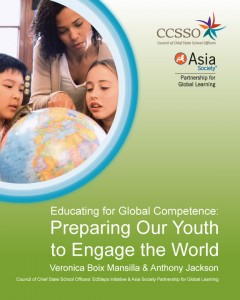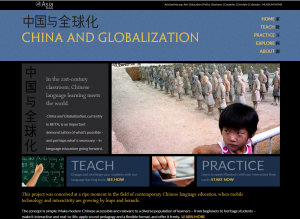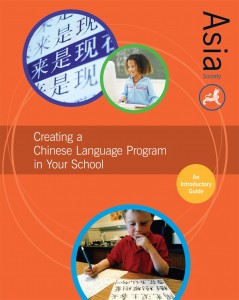If you are a principal looking to globalize education in your school and better prepare your students for the global innovation age, there are several ways for you to engage with our work:
- Global Competence
- School Design
- International Studies Schools Network
- Curriculum Support
- Language Learning
- Expanded Learning
- Professional Development for Educators
- Research on Best Practices
- Funding Guide
Global Competence
 The definition of global competence outlines the skills and knowledge that students need in order to succeed in college and career today’s in globalized world.
The definition of global competence outlines the skills and knowledge that students need in order to succeed in college and career today’s in globalized world.
The book Educating for Global Competence: Preparing our Youth to Engage the World provides more information about the definition of global competence and how to operationalize it.
School design
The first step in promoting global competence in your school is to work with the entire school community to create a vision and culture in which global learning is prioritized and integrated throughout all aspects of learning.
Vision
In order to truly strive for students in your school to graduate both globally competent and college ready, school leadership must work with the educators and the community to develop a common vision for the school, predicated on these dual goals.
Creating this shared vision requires that school leadership fully understand global competence and what it means to be a globally-focused school. To develop this vision, consider intended outcomes – for the students, the educators, and the entire community.
Ideas on How to Get Started
- Read and discuss Educating for Global Competence: Preparing our Youth to Engage the World with your school community.
- Write an open letter to your community, outlining your global vision for the school.
- Create a system of collaborative leadership that engages your staff in the task of refining and implementing the school vision.
Culture
In order to promote global competence and college readiness, school leaders must cultivate a school culture that supports and prioritizes global learning.
To establish such a culture, school leaders must evaluate existing school culture and understand the key role that they will play in designing and implementing a globally-focused school culture. This new culture must view teachers as leaders and give them time to think, plan, and work collaboratively and provide students the freedom to pursue and shape their own learning and development.
Ideas on How to Get Started
- Map your assets.
- Strive to build a diverse school community.
- Set goals and plans as a school and regularly reflect on your progress towards achieving them.
- Empower students to customize their own learning experience.
- Encourage teachers to share the leadership responsibility. This collaborative leadership model will help to drive and support the cultivation of your new school culture.
ISSN School Design Matrix
The International Studies Schools Network (ISSN) School Design Matrix is a tool that guides school leaders and educators through the process of developing a globally-focused school. This matrix can be accessed online and can serve as a foundational document and starting point for schools just beginning to emphasize global learning, providing an assessment of the school and a blueprint for where it needs to go.
The matrix provides guidance across six domains that are necessary to support global learning:
- Vision, Mission, and School Culture
- Student Learning Outcomes
- Curriculum, Instruction, and Assessment
- School Organization and Governance
- Professional Learning Communities
- Partnerships
The school leaders and educators within the ISSN utilize this matrix to ensure that they are creating and sustaining a school culture and environment that supports and inspires learning with and about the world. Asia Society supports ISSN schools in transforming their school culture into one that truly fosters and encourage global learning.
Learn MoreInternational Studies Schools Network
Need more?
Consider joining the Asia Society’s International Studies Schools Network. It’s a network of global schools in which we have piloted and refined the Graduation Performance System (GPS). The GPS is a performance-based system of curriculum, instruction, and assessment and serves as mechanism to drive educators to develop and continuously refine high-quality, global curriculum and instruction. GPS curriculum, performance outcomes, and rubrics are aligned to the Common Core State Standards. This system is one of many supports that we provide our ISSN schools as we help them prepare their schools for career and college in an increasingly global world.
Many of the ISSNs are located within the same district. So, our work with them involves a broader partnership at the district level, as well as relationships with individual schools. These relationships involve:
- An initial assessment of school culture and global focus
- Site visits
- On-site coaching work
- Professional development workshops and events
- Attendance at our annual Partnership for Global Learning Conference
- Access to and support utilizing our digital GPS platform, curriculum modules, performance outcomes and rubrics, and “I can” statements.
Curriculum Support
As part of the Asia Society developed learning methodology—the Graduation Performance System (GPS)—we have developed a series of high-quality, global curriculum modules. These modules are relevant, rigorous, and globally significant. They provide students with authentic learning experiences and assessments and ensure that students are learning the skills they will need to succeed in college and career. These curriculum modules are intentionally linked to both the GPS Performance Outcomes and the Common Core State Standards (CCSS). A study led by The Educational Policy Improvement Center (EPIC) found that students who master Asia Society’s GPS performance outcomes in ELA and Math would be expected to significantly increase mastery of the CCSS.
These curriculum modules are quick, easy ways for you, as the principal, to help educators in your school globalize their teaching while meeting the CCSS. They offer a simple entry point for you to begin learning about our work and taking small steps towards integrating global learning into your school culture and classrooms.
We currently offer 5 curriculum modules as e-books that can be downloaded to your computer or tablet device. These curriculum e-books allow educators to access the high-quality curriculum modules that Asia Society created as part of our Graduation Performance System (GPS).
The curriculum modules that are currently available include:
- World Hunger (Pre-calculus)
- Euro Crisis (Social Studies)
- Learning about the Beauties and Patterns of Language (World Languages)
- Wayfinding (Arts)
- The Social Entrepreneur in You (English Language Arts)
- [add science unit]
We plan to release more curriculum module e-books in the coming months.
Language Learning
For principals looking to establish a foreign language program, Asia Society offers a variety of articles and initiatives that can help you make the case for the importance of today’s students learning to speak another language.
Learn More Asia Society provides Chinese language learning resources that can be utilized by teachers in your school. These resources include ideas and tools to foster language learning in your school and an online learning platform titled China and Globalization. This learning website offers online lessons that teach students about both Chinese language and culture.
Asia Society provides Chinese language learning resources that can be utilized by teachers in your school. These resources include ideas and tools to foster language learning in your school and an online learning platform titled China and Globalization. This learning website offers online lessons that teach students about both Chinese language and culture.
If you are a principal just looking to start a Chinese language program at your school, we also have several guidebooks to help you get started:
- Creating a Chinese Language Program in Your School: An Introductory Guide
- Chinese Language Learning in the Early Grades: A Handbook of Resources and Best Practices for Mandarin Immersion
Expanded Learning
Success in college and career now requires that students master 21st century skills, such as critical thinking, analysis, and problem solving, within and across all disciplines. Parents and policymakers are demanding that schools ensure that US students are developing these vital skills. With this increasing demand and accountability, educators are looking for ways to expand learning opportunities beyond the boundaries of the traditional academic day or year. They find that by increasing their time and diversifying their learning partners and experiences, they are improving their ability to teach for global competence and providing greater opportunities to their students.
Our Global Competence in Expanded Learning Time guide is directed at school leadership teams and provides practical advice on how to use expanded learning and afterschool programs to better prepare your students for their global future.
Learn MoreProfessional Development
We offer a variety of professional development opportunities specifically for school leaders looking to help educators in their schools to better teach their students about the world.
Webinars
Global Learning for Educators is a free, year-long webinar series. The 2012-2013 line-up featured a variety of presentations.
 Last year’s topics included several that were specifically directed towards school leadership:
Last year’s topics included several that were specifically directed towards school leadership:
- School Leadership in a Changing World
- Educating for Global Competence: The Future of Education, Today
- Schools: Go Global and Prepare Students for Success
- What We Can Learn about Education from International Data
Recordings and slides from past webinars are available on our website. We hope you’ll use them a basis for school and community conversations about what you must do to provide your students with a 21st century global education.
The next webinar series will begin in the Fall of 2014.
Learn MoreOnline Courses
Currently, much of our professional development is offered to schools that are members of the International Studies Schools Network or are participating in Project Mastery. However, in the fall of 2013, we are going to begin offering online professional development courses that are open to all educators and school leaders. Our hope is that these online courses will allow global learning to reach an even larger audience of educators and eventually students.
Text from Honor’s descriptions.
Learn MoreCustomized Professional Development
Asia Society also offers more customized professional development for both school leaders and educators that are part of the International Studies Schools Network (ISSN). This professional development helps educators to integrate global learning into their classrooms and helps them to create authentic, project-based learning experiences for their students.
Members of the ISSN receive professional development through site visits, workshops, on-site coaching, networking opportunities, and an annual ISSN Summer Institute. This support and the Asia Society learning methodology have allowed ISSN schools to achieve graduation rates and student achievement that surpass other urban schools.
Learn MoreResearch on International Best Practices
Through our work both within the United States and around the world, we are able to learn from and with some of best educators and education systems in the world. We strive to share best practices from around the world with educators and school leaders, so that they can begin to implement them in their schools and classrooms.
International Summit on the Teaching Profession
Each spring, education ministers, master teachers, national union leaders, and education organization leaders convene from countries with high performing and rapidly improving educational systems. The purpose of the gatherings is to identify best practices worldwide that strengthen the teaching profession and raise student achievement. Summit organizers, in collaboration with Asia Society, produce a publication each year on key lessons.
The first two summits in 2011 and 2012, held in the United States and hosted by U.S. Secretary of Education Arne Duncan, developed a consensus that achieving a high-quality teaching profession is critical to education systems as they face the increasingly ambitious demands of the 21st century. Moreover, the highest performing countries are successful because they take a comprehensive approach to recruiting, preparing, supporting, and retaining talented teachers and school leaders. The Summits spurred action on these issues in many of the participating countries over the past two years.
The 2013 Summit, which was hosted by the Dutch Ministry of Education, the OECD, and Education International (the global federation of teachers’ unions), took on the complicated issue of teacher evaluation.
- 2013 Summit Report – “Teachers for the 21st Century. Using Evaluation to Improve Teaching.”
- 2012 Summit Report – “Teaching and Leadership in the 21st Century.”
- 2011 Summit Report – “Improving Teacher Quality Around the World.”
These reports provide policymakers around the world with concrete policy ideas and actions that are successfully improving teaching and learning around the world. We encourage policymakers interested in promoting global education and higher levels of student achievement to utilize these valuable reports.
Learn MoreThe Global Cities Education Network
From our Global Cities Education Network (GCEN) we are currently learning from high-performing cities in North America and in Asia what it takes to achieve equity in access to a high- quality education system. This initiative has demonstrated to us, yet again, the vital role of teachers in ensuring that all students are achieving at high levels. From the research completed as part of this initiative we have been able to document policies that allow cities to create and sustain a quality teaching force and to ensure that all students are learning. While much of this research is directed towards the district level, there are clear school-level lessons and policy changes that can improve teaching and learning at your school.
Learn MoreFunding
Asia Society, in partnership with The Finance Project, created a guide titled Funding Global Learning that is focused on how to create financing strategies as well as how to identify and secure funding. The guide covers how to frame the argument for global competence; how to manage diverse funding strategies; the types of federal and state funding sources; and how to match funding streams to your goals. The guide also introduces other resources to turn to for help.
Few funding sources directly target global learning, and issues such as time-limited grants, the downturn in state and local budgets,and competition for limited resources creates a challenging backdrop against which out-of-school leaders seek to implement or expand programs. This guide is designed to help overcome these challenges so programs can focus on do what they do best: preparing students for the world.
To get started, download the Funding Global Learning guide. See also a companion guide for funding afterschool programs.

